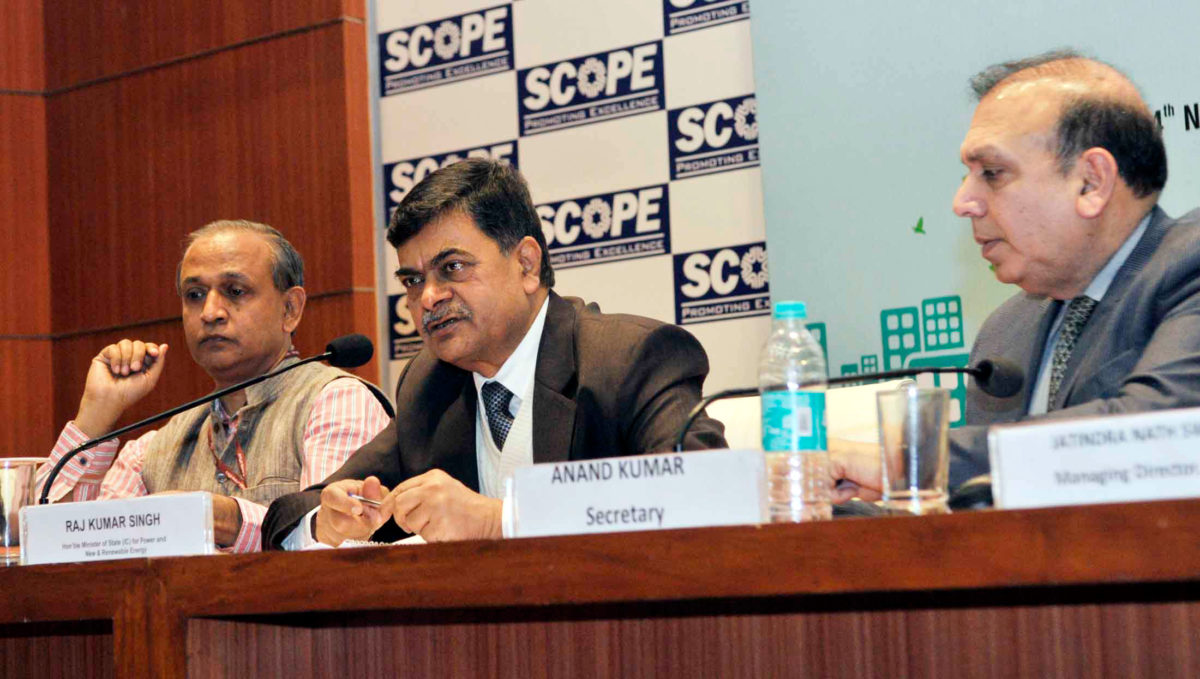Raj Kumar Singh, Union Minister of State, Ministry of New and Renewbale Energy (MNRE), has announced the government is working on a scheme and will soon issue an Expression of Interest (EoI) to industry, to establish domestic renewable energy (RE) manufacturing facilities totaling 20 GW.
It is hoped the announcement, made at a meeting held in New Delhi last Friday, November 24, will encourage and support the “Make in India” policy in the RE sector. While the auction has been earmarked for the whole RE sector, it is believed solar will comprise the majority, if not all of the 20 GW, due to the sector’s domestic content requirement policy, and low demand in the wind sector.
While there was no detailed information available on the proposed auctions, Dharmendra Kumar, Analyst- Solar Energy at IHS Markit – India told pv magazine, “The ministry is expected to release an Expression of Interest in the first week of December 2017. The government will either provide land required for the manufacturing plant, or it will facilitate the land acquisition on behalf of the company.”
According to IHS Markit, the government will send out request for proposals (RfP) by January 2018 and as per discussions, any company bidding for the full 20 GW capacity, will be given priority. However, before sending RfPs, the government will make ensure enough demand is generated, so that there is profit for the whole solar chain.
“If the government doesn’t get good response, then there are chances [it] will look for options where 5-10 GW capacity manufacturing plant can be set-up,” Kumar added.
Capital subsidies
Commenting on the proposed auctions, Vinay Rustagi, MD, Bridge to India, told pv magazine, “We believe the government is planning to develop 20 GW of integrated solar module manufacturing capacity. Details are not available yet, but it seems that the government will allocate capital subsidies as well as earmarked project development capacity to players offering to set up manufacturing facilities on a competitive auction basis.”
Rustagi added that the main challenge for the government will be to ensure that the new policy stays within the WTO framework.
IHS Markit believes the manufacturing auctions will both boost the country’s ‘Make In India’ policy and attract international players to set up facilities. In the past, Kumar said, foreign manufacturers displayed interest in manufacturing in India, but then it didn’t happen.
He pointed to Trina Solar as an example, which went as far as to sign a memorandum of understanding with the state of Andhra Pradesh in 2015. The Chinese solar giant was supposed to establish a 2 GW PV manufacturing plant with an estimated investment of INR 28 billion (US$435 million). But, after conducting a feasibility study, the project was halted.
Industry demands
The meeting in New Dehli was held to address demands by industry over how the government’s ambitious RE targets will be rolled out, and how a domestic manufacturing industry could be encouraged and grown. pv magazine India reported on the new roadmap laid out by the government, yesterday.
A crucial issue for manufacturers, and the forthcoming auction, will be the anti-dumping duty (ADD) case. According to Bridge to India, a decision is expected by 2018 October; however, it could be made earlier.
Also at the meeting, the MNRE said it is exploring innovative ways to deliver additional installed RE capacity via floating solar power plants on dams, offshore wind energy systems, and hybrid solar-wind power systems, which could provide over 10 GWof additional solar capacity. “The MNRE team of experts has already surveyed the Bhakra Nangal dam for floating solar power plants,” said MNRE’s Singh.
This content is protected by copyright and may not be reused. If you want to cooperate with us and would like to reuse some of our content, please contact: editors@pv-magazine.com.








By submitting this form you agree to pv magazine using your data for the purposes of publishing your comment.
Your personal data will only be disclosed or otherwise transmitted to third parties for the purposes of spam filtering or if this is necessary for technical maintenance of the website. Any other transfer to third parties will not take place unless this is justified on the basis of applicable data protection regulations or if pv magazine is legally obliged to do so.
You may revoke this consent at any time with effect for the future, in which case your personal data will be deleted immediately. Otherwise, your data will be deleted if pv magazine has processed your request or the purpose of data storage is fulfilled.
Further information on data privacy can be found in our Data Protection Policy.